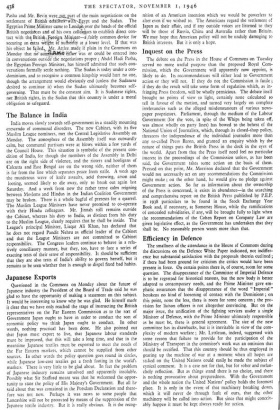Inquest on the Press
The debate on the Press in the House of Commons on Tuesday served no more useful purpose than the proposed Royal Com- mission, which the Government will apparently now appoint, is likely to do. Its recommendations will either lead to Government action or they will not. If they do not the Commission is futile ; if they do the result will take some form of regulation which, as in- fringing Press freedom, will be wholly pernicious. The debate itself brought no points of view to light, certainly none calculated to tell in favour of the motion, and turned very largely on complete irrelevancies such as the alleged misdemeanours of various news- paper proprietors. Parliament, through the medium of the Labour Government (for the vote, in spite of the Whips being taken off, was almost wholly on party lines) has bowed to the behest of the National Union of Journalists, which, through its closed-shop policy, threatens the independence of the individual journalist more than any so-called Press Baron, and granted an enquiry which by the nature of things puts the British Press in the dock in the eyes of the world. Apart from that the Press itself need feel no particular interest in the proceedings of the Commission unless, as has been said, the Government takes some action on the basis of them. Pressed on that point, Mr. Morrison declared that the Government would not necessarily act on any recommendations the Commission might make ; on the other hand, he would give no pledge against Government action. So far as information about the ownership of the Press is concerned, it exists in abundance—in the searching and comprehensive report on the British Press published by P.E.P. in 1938 particulars to be found in the Stock Exchange Year Book and, if necessary, at Somerset House, while the ramifications of concealed subsidiaries, if any, will be brought fully to light when the recommendations of the Cohen Report on Company Law are given legislative effect, as the Government has undertaken that they shall be. No reasonable person wants more than that.


































 Previous page
Previous page